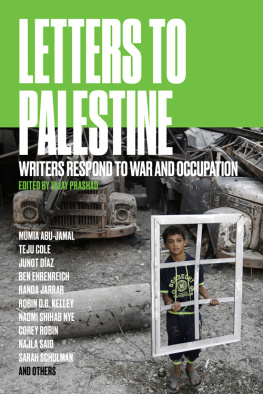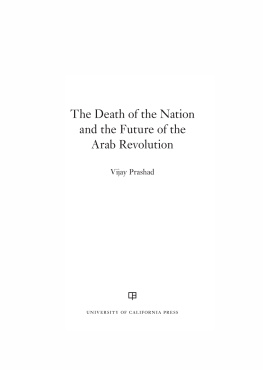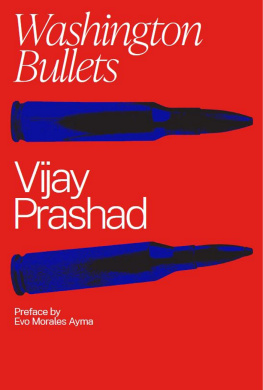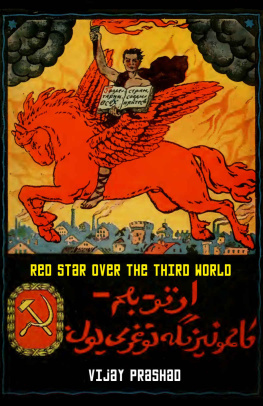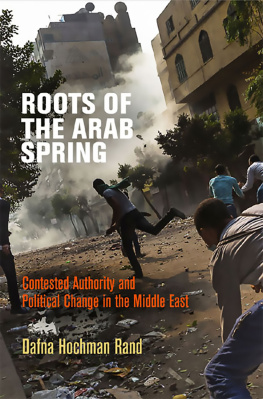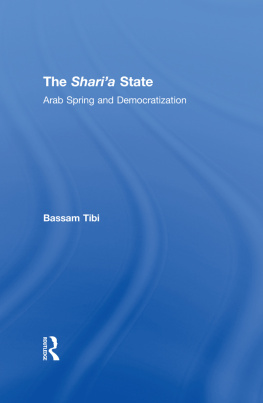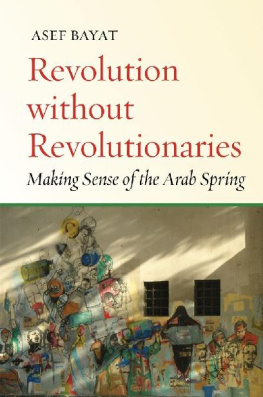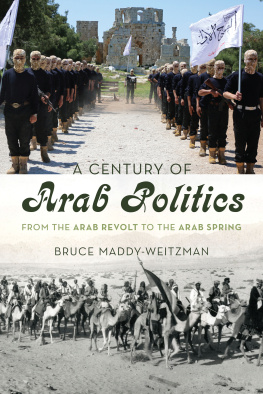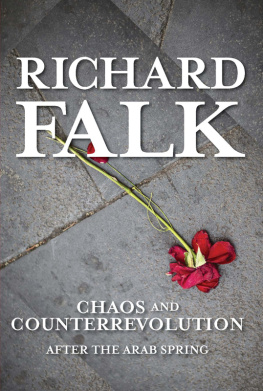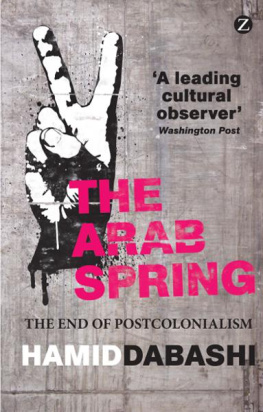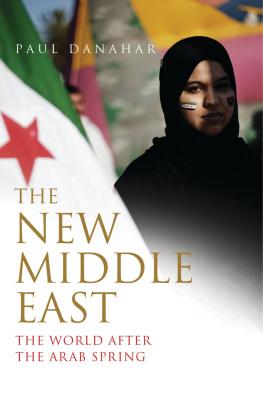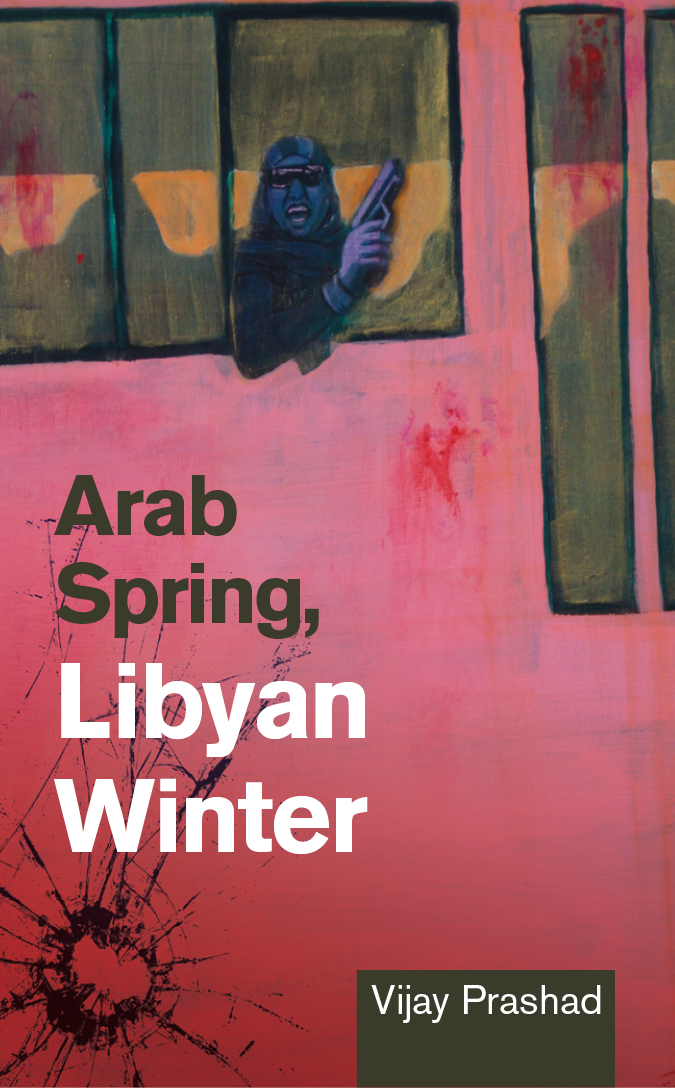
Arab Spring, Libyan Winter
Vijay Prashad

AK Press Publishing & Distribution
Oakland | Baltimore | Edinburgh
April 2012
Dedication.
He who has not lived in the years before the revolution cannot know what the
sweetness of living is.
Talleyrand, via Bertolucci, Prima della
Rivoluzione , 1964.
This book is for Brinda Karat.
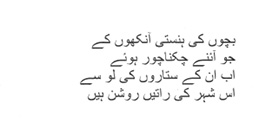
Those shattered mirrors once were
The smiling eyes of children
Now are star-lit
This citys nights are bright.
Faiz, ek nagma karbala-e Beirut ke liye , 1982.
And for Anthony Shadid (19682012).
Most humane of reporters.
Openings.
Revolutions have no specified timetable. Karl Marx used the image of the Mole to stand in for Revolutions to explain their hard-working yet unreliable nature. The Mole spends its time making tunnels underground, and then, when you least expect it, breaks the surface for a breath of air. Well burrowed, Old Mole, Marx wrote; the breaking free to the surface is the spectacular part of the Revolution, but it is the burrowing, the preparing, that is the most important part. The least prepared Mole is the easiest to defeat because it has not groomed its subterranean space effectively enough. Such is true of the Revolution: if it has not taken the grievances of the people and produced organizations capable of withstanding the counter-revolution if it has not harnessed these grievances to the discipline of revolutionary forcethen it is easily defeated. It is the burrowing that is essential, not simply the emergence onto the surface of history.
A process of preparation has been long afoot in West Asia and North Africa, all at a different tempo. In Tunisia and Egypt there have been many constitutional challenges to the one-party state, by which I mean challenges within the bounds of the constitution: protests and attempts to forge independent political platforms, including through the Muslim Brotherhood in Egypt, as well as attempts to found a new human rights sensibility (for example, in the campaigns of people like Ayman Nour). All of this is prologue, the work of building movements and a new vision for their societies. Much the same process was underway in Bahrain, via political parties like al-Wefaq, mainly, but also in the human rights redoubts, such as the Bahrain Centre for Human Rights and in the secular outposts that linger in the shadows of a theocratic state.
Libya was not fated for an easy Arab Spring. As Aijaz Ahmad once put it, every country gets the fascism it deserves. In that spirit, every country gets the rebellion it deserves. Libya did not deliver the uplifting narrative of Tunisia or Egypt. It faced a complex situation, with a leader who could speak with the rhetoric of his own 1969 revolution but whose state had moved a long way towards the opposite of what he promised. Working-class protests in the industrial suburbs of Tripoli conjoined with political Islamist unrest in the eastern part of the country. These were the rumbles from below. They were harnessed by human rights lawyers from Benghazi and by neoliberal reformers, who were disheartened by the pace of change in the Qaddafi regime. It was this latter, these neoliberal reformers who were able to set the pace of the Libyan revolt. Such people were not central to the revolts in Egypt and Tunisia, where the people, as a mass, stood up and were fortunate that the military stood down.
The Atlantic powers, led by the United States, France and Britain, saw the pillars of their regional stability wear thin by the developments in Tunisia and Egypt as well as Bahrain and Yemen. Libya provided a unique opportunity. The Atlantic states did not intervene on the side of the people in any of the other struggles. Rather they stood by their old pillars of stability, concrete and trowels in hand. As the University of Tehran scholar Yaghoob Javadi put it, the Atlantic states preferred regime rehabilitation to regime change. With Libya, things were different. Even though Qaddafi had given his regime over to the Atlantic states as an ally in the War on Terror and as a provider of oil, the erratic nature of his decision-making and the blocked transit to a full neoliberal dispensation inside the country earned him few friends in the Atlantic capitals. The Gulf Arab emirs hated Qaddafi for his frequent outbursts against them (most recently at a summit in Doha, Qatar, in 2006 when Qaddafi said that the Saudi monarch was made by Britain and protected by the US, embarrassing the emir of Qatar and angering the Saudis). Personal animosity plays a role when it comes to absolute monarchs, whose whims are not to be discounted. But the turn against Libya was not about whim alone. Interests in oil and in political stability played their part.
The Atlantic powers made a deal with the Saudis and the Gulf Arab states that allowed the latter to silence dissent on the Arabian Peninsula (Bahrain and Yemen), if they would deliver the Arab League, and thus the United Nations, for a NATO-led intervention in Libya. The spotlight shone on Qatar, which did the leadership work for the Gulf Arabs. Its emir could remarkably draw the shine from the Arab Spring, dent its republicanism and fashion himself as a rebel in Libya, not in Doha. The oil is a central issue with Libya, but so too was its political significance. That the Atlantic states and their Gulf Arab partners decided to intervene in Libya and not in Bahrain or Yemen, and certainly not in Syria, tells us something. It is what this something is that I will unravel in this brief book.
No revolt or revolution is capable of being rendered mute by the attempt of a clique to seize control of it. Tendencies to a better future continue and thrive. The Libyan revolt was certainly hijacked by the neoliberal reformers, but the people of Libya have not surrendered the wider aspirations that motivated them to risk everything in this battle. Tensions remain in the country. Qaddafi has been killed, his son Saif al-Islam is in custody, and much of the formal regime has collapsed. The neoliberal reformers remain in the shadows, running the Central Bank and the oil ministry. But they have to contend with the fighters who are not willing to transfer authority over to the reformers. The fighters comprise equal parts of Islamists and amateurs, with their roots as much in their cities of origin as in the global ummah . They have their own agendas. This book will appear at the anniversary of the start of the Libyan revolt. It is too early to tell how things will pan out. This book does not risk more than a few general remarks. Arab Spring, Libyan Winter is less about predicting the future and more about showing us how the Atlantic powers insinuated themselves into the Arab Spring, to attempt to create a Libyan Winter to the advantage of their national interests, the interest of the multinational oil firms and the neoliberal reformers within Libya.
Part I: Arab Spring.
I. Bread
When the unwashed began to assert themselves in France, the royalty scoffed at them. What they wanted was bread, whose price skyrocketed in 177475. Taking to the streets in remarkable numbers, the people demanded fair prices for bread, their main staple. In reaction to la guerre des farines , the flour war, Marie Antoinette proposed that the poor eat cake. After the Revolution removed the monarchy and its lves from the thrones of power, the new government hastened to subsidize bread. Hunger broke the back of fear. It is the lesson for the ages.
Next page

